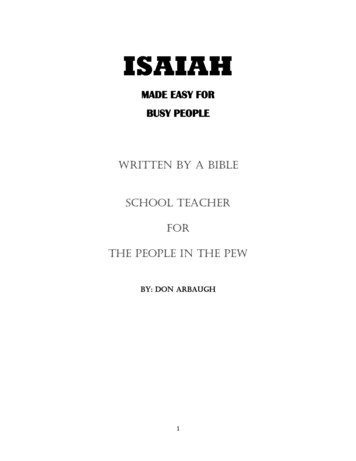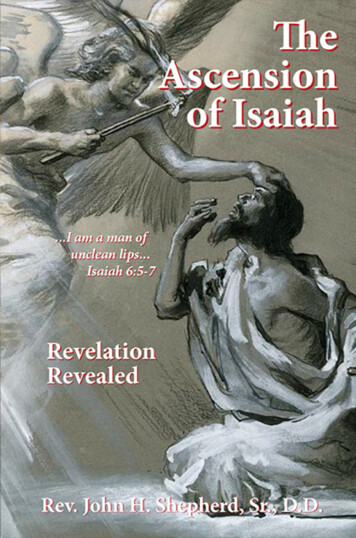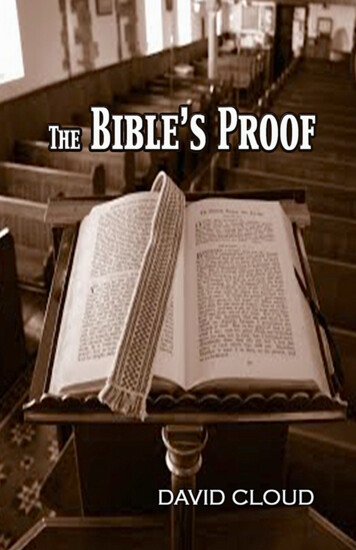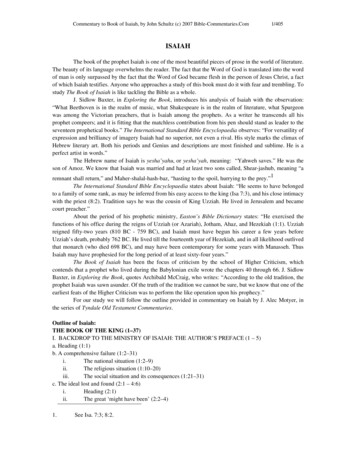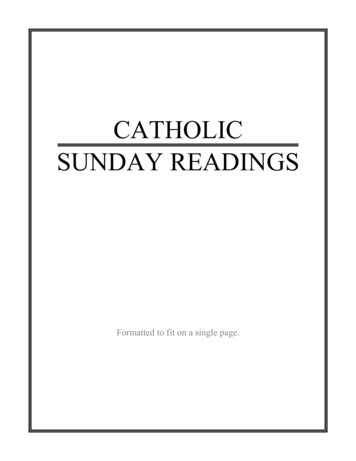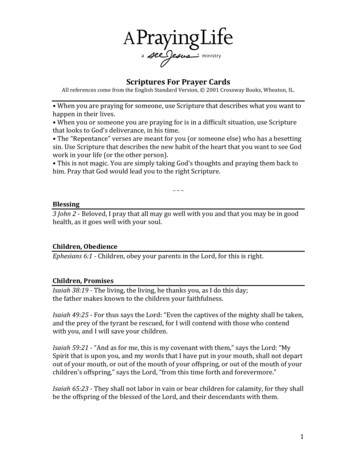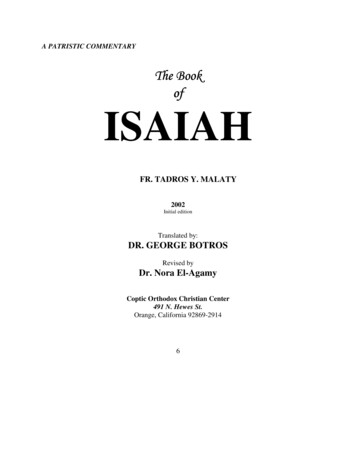
Transcription
A PATRISTIC COMMENTARYThe BookofISAIAHFR. TADROS Y. MALATY2002Initial editionTranslated by:DR. GEORGE BOTROSRevised byDr. Nora El-AgamyCoptic Orthodox Christian Center491 N. Hewes St.Orange, California 92869-29146
THE PROPHETSThe books of the Holy Scripture from Isaiah to Malachi are called “Prophetic Books.”That does not mean that prophecy began by Isaiah. It has been there since the prophet Mosescame as the first leader of the people of Israel. Still certain scholars believe that prophecy goesback to the dawn of human life, considering Adam himself a prophet.On the other hand, the prophetic books, do not stop at presenting prophecies, but theyembrace history, laws, wisdom, and even poetry, etc.THE PROPHETSThe term ‘Prophet’ is not to be understood as a certain person revealing future events, asmuch as revealing God’s mind and will concerning man, especially his eternal salvation, to berealized through the Lord Christ. God introduced the prophets as His own men to testify to Him,strongly and courageously. However His Holy Spirit supported them, at a time when the religiousand civil leaderships, clergy and kings alike, have gone astray. Many priests became preoccupiedby love of authority, dignity, and life of luxury; that led them to do their best to gain the favor ofkings and rulers, at the expense of their duties toward their people’s souls. The killing letter, as away to cover up their inner corruption, also preoccupied them. Kings and rulers, on the otherhand, became preoccupied with vainglory, depending on human planning, disregarding faith inGod and leaning on Him. That is why prophets appeared on the stage to confront the corruptionof both leaderships and people alike, something that aroused the animosity of all of them.The following line came clear in all the writings of the prophets:1. Repentance or return to God with the heart, and not with superficial practices, is theright way to deal with inner and outer: social, political, and spiritual problems.2. Exposing the wrongdoings, especially those of the religious and civil leaderships, notfor the sake of defaming them, but rather to seek the true spiritual cure.3. Prophesying of near future local events, in order to confirm God’s chastisement forcorruption and lack of trust in Him; or to confirm His compassion as a result of their repentance,as for example the captivity of the people of Israel and their return from it.4. Prophesying of far future events, the center of which is the coming of the SaviorMessiah, who set up a spiritual kingdom that would embrace nations and people.5. God alone is the Savior; and salvation is the only subject that should preoccupy thethoughts of all.7
Prophecies of prophets, numerous as they are, liken a guitar, on the cords of which, theHoly Spirit of God plays faultlessly, to offer a symphony of God’s love, through the redemptivework of Christ.MAJOR AND MINOR PROPHETSScholars used to differentiate between Major Prophets (Isaiah, Jeremiah, Ezekiel, andDaniel), and minor ones (the rest of the prophets). This distinction is not based on thedifferentiation of the prophets themselves, but rather on the relative sizes of their books. Certainscholars liken the Minor Prophets to small atomic bombs that embody, nevertheless, hugeenergies1.1J. Vernon McGee: Isaiah, 1982, p. 7.8
INTRODUCTIONTOTHE BOOK OF ISAIAHIsaiah was called “The prophetical Evangelist,” and his book “The Gospel of Isaiah,” orthe “Fifth Gospel.” Whoever reads it would see it as one of the New Testament books, and itsauthor as an eyewitness to the life of Lord Christ and His redemptive work, especially the“cross;” he would see a lively portrait of redemption, and its deep divine mysteries.St. Jerome says, [In the book of Isaiah, I see an evangelist narrating the life of JesusChrist; besides being a prophet who speaks of things to come1.]H. A. Ironside says that more than any other prophetical book, the book of Isaiah includesthe most perfect Messianic prophecies in the Old Testaments; definitely testifying to the passionsof Lord Christ, and to all the glories that followed them2.Fathers of the Church, in their debates with unbelievers, depended on it, because of thenumerous and clear prophecies it included, concerning the Person of the Lord Christ, Hisredemptive work, His Church, His Holy Spirit etc.3Shortly after St. Augustine converted to the Christian faith, the elderly Bishop St.Ambrose asked him what he was reading, to which he answered, “Isaiah4.”ISAIAHThe name “Isaiah” was common among the Jews; we find, at least seven persons in theHoly Bible who carry this name.“Isaiah” is the same as “Jeshaiah,” mentioned in Ezra 8:7; Neh. 11: 7; 1 Chro. 3:21; itmeans “God’s salvation,” or “God saves.” His name came to reveal his mission; as his bookcarries, in its wholeness, a clear and prominent trend, that concerns the amazing salvation ofGod, realized by the coming of the Victim Messiah, the Founder of the Kingdom, and theGrantor of glory.He was called by the name “Isaiah, the son of Amoz” (Is. 1: 1), to designate him from theother persons carrying the same name. Many scholars believe that the name “Amoz” here is not.8 19492H. A. Ironside: Expository notes on the Prophet Isaiah, 1985, p.3.Cf. Epistle of Barnabas; St. Justin: Apology 1; Dial. with Trypho.4Hurry Bultema: Commentary on Isaiah, Michigan, 1981, p. 19.39 : 1
that of the prophet “Amos1.” According to the Jewish tradition, he was the brother of “Amsea”the king of Judah; and also a prophet.He had been in Jerusalem, and worked in it (Is. 7: 3; 22: 1, 15; 37: 2; 38: 5; 39: 3). UnlikeJeremiah, he was married, and got children. Jeremiah has denied marriage, to spare his family thebitter circumstances, that were to come to the people, and the corruption that became like acontagious plague. Isaiah, on the other hand, got married, and his wife was called the“prophetess” (Is. 8: 3); not that she practiced prophecy, but because she shared with her husbandhis spiritual strife and his feelings, becoming for him, the best companion and support of hismission. They got, at least, two sons, who carried two symbolic names; the older was called“Shear Jashub,” meaning “the remnants will return” (Is. 7: 3); and the younger was called“Maher-Shalal-Hash-Baz,” meaning: “hasten to loot” (Is. 8: 3). The two names reflected Isaiah’sprophecies, as we shall see.Isaiah had been proud of his family, sanctified in God, as well as of his spiritual disciples,whom he counted as his sons and family, saying, “Here am I and the children whom the Lordhas given me! We are for signs and wonders in Israel” (Is. 8: 18)The apostle Paul used that phrase to symbolize for our Lord Jesus Christ who leads Hisdisciples to glory. (Hebrews 2: 13)RELIGIOUS, SOCIAL, AND ETHICAL CIRCUMSTANCES AT THETIME OF ISAIAH1. Isaiah lived in Jerusalem - as a member of the royal household - in an aristocraticatmosphere, sitting with kings making friendship with them and offering them the good counsel.He had been a prophet in the kingdom of Judah, and he, most probably occupied an importantposition in the royal court, that was obvious in his awareness of the political, religious, and socialcurrents at that time. He exposed the party, that was encouraging the alliance with Egypt (Is. 29:15; 30: 1); and managed to remove Shebna from his prominent position (Is. 22: 15).He began his prophetical work in the year king Uzziah of Judah died (740 or 739 B.C.).But that does not mean, that he started it after the death of the king, but most probably just beforethat. He kept on working his mission until the death of king Hezekiah (697 or 696 B.C.); andaccording to Jewish tradition, during the reign of king Manasseh, son of Hezekiah. Thus, hisprophetical work covered more than 50, or may be 60 years.His life on earth ended by being sawed by a wooden saw, by the order of king Manasseh,according to Jewish tradition, and writings of certain Fathers of the Church2. This might be whatthe apostle Paul meant, when he spoke of those who were “sawn in two.” (Hebrews 11: 37)12Ibid, p. 1.Origen: Commentary on Is. 3:6-12; St. Justin: Dial. with Trypho.10
2. Isaiah used to see in the streets of Jerusalem, the capital, the carriages of the king, hishousehold, and rich haughty elite, together with their spoiled wives who lived in great luxury andindulgence, proudly and arrogantly riding their chariots. He watched the daily luxuriant banquets,incessantly held in the royal palace, attended by the military, religious, and civil leaderships; allof them drinking wine profusely, to turn these banquets into scornful and disgraceful sittings. Atthe same time, he used to see how these rich people used to enter the temple, to offer sacrificesand offerings without count, seeking through them acknowledgment and respect from the greedyreligious leaders; then to go back to practice pagan transgressions next to the temple! That wasthe situation in the city that was referred to God, and in which His Holy temple was erected;while the screams of widows, orphans, poor, and afflicted, were sounding in the ears of theprophet, and rather rising to the throne of God.The kingdom of Judah was corrupted, both the leadership and the people “The wholehead is sick, and the whole heart faints. From the sole of the foot even to the head, there is nosoundness in it, but wounds and bruises, and putrefying sores. They have not been closed orbound up, or soothed with ointment.” (Is. 1: 5, 6)Some scholars believe that what became of Judah, would definitely infect the rest of theworld, in a way or another, as for example:a. Gathering into a mass, for the sake of enjoying human authority, not depending on thatof God (Is. 8: 9-13).b. Spiritual ignorance, while the reasonless nature instinctually submits to its Creator,man is ignorant of his Creator, who cares for his salvation and eternity (Is. 1: 2-4).c. Corruption of leadership with childish and immature deeds, together with interferenceof woman race with deviated authority, even among some of the religious circles (Is. 3: 12); andspreading of the spirit of hypocrisy without objectivity of truth itself.d. Selfishness and love of money, with all of what to follow, of practicing unfairness andlove of bribes (Is. 1: 23).e. Licentiousness of faith; accepting religion, while denying the redemptive work of God,commitment to truth, or believing in eternal judgment.POLITICAL SITUATION1Isaiah lived at a time when the world was overwhelmed by great powers; starting by thestruggle between Egypt and Assyria to dominate it; then, during the last days of Isaiah, betweenAssyria and Babylon. The slogan of these nations has been “Power is the truth.”As to how that struggle affected Israel (the Northern Kingdom), and Judah, that we can1H. Bultema, p. 12-15; The New Century Bible Commentary: R.E. Clements, Isaiah 1-39, 1988, p. 9-11.11
know by reading (2 Kings 15-17): Menahem king of Israel gave silver to Pul, king of Assyria to let him reign over his kingdom,Israel. (2 Kings 15:19, 20) In the last days of Azariah, King of Judah, when Isaiah received his mission, Tiglath-Pileser,king of Assyria, conquered Pekah, king of Israel (2 Kings 15: 29). The later destroyed thearmy of Ahaz, king of Judah, killed 120,000, and took 200,000 captives. He had an alliancewith Rezin, king of Syria, against Judah for political reasons. They wished for Judah to jointhem, with a support from the Pharaoh of Egypt, to confront Assyria; yet Judah rejected thatoffer, preferring to join Assyria against them.I will not go into details of the political events; except to say that Hosea killed Pekah thensubmitted to pay tribute money to Assyria (2 kings 17: 3). But, as Shalmaneser of Syria did nottrust him, he put him in prison, besieged Samaria for three years and carried Israel away tocaptivity (2 kings 17: 4-6), in the year 722 B.C.If Samaria, capital of the ten tribes, selfishly made a pact with Aram Syria against Judah;Yet, Judah in its turn, committed a political miscalculation: Ahaz sent messengers to TiglathPileser, king of Assyria, saying, “I am your servant and your son,” begging him to save him fromthe hands of the kings of Syria and Israel (2 Kings 16:7), presenting him with the treasures of thetemple and palace. Tiglath-Pileser did support him, but later despised him and withdrew hisassistance (2 Chronicles. 28: 20, 21). After that, Sennacherib, king of Assyria, came with a greatarmy, and entered Judah, in the days of Hezekiah, son of Ahaz. God allowed the destruction ofmany cities, but kept Jerusalem for some time.Isaiah lived in that atmosphere with a heart burnt with love towards his people, and abitter soul, because of the dissension between Ephraim (Israel) and Judah, that went so far, to theextent that each of them made a pact with foreign nations against the other. On the other hand,Isaiah watched, how Judah, although seeing the destruction that happened to Samaria, not morethan 35 to 49 miles away from Jerusalem (Is. 22: 1), yet, kept on in its evil way.Isaiah, as a patriotic man, was preoccupied with Jerusalem, the capital of Judah, the cityof God, and the center of his dreams and hopes. He often spoke of it, yet openly used to reveal itsdefilement and licentiousness, proclaiming his struggle, not only for the sake of its protectionpolitically, but also for its sanctification on behalf of the Holy God.Isaiah, as a wise man of politics, and through the guidance of the Holy Spirit,comprehended the circumstances that were prevailing at his time. He prophesied about the fall ofDamascus and Samaria, and the extension of the authority of Assyria over the Middle East (Is. 7).His prophetic insight went forward to a faraway future, to see the danger of Babylon on Judah(Is. 39); and in the spirit of hope, he proclaimed the return of all the people - all tribes - from theBabylonian captivity.12
Isaiah saw in Assyria (and later in Babylon), means of divine chastisement against Israeland Judah. The people of Judah were unable to imagine the possibility of an Assyrian invasion ofJerusalem; but the prophet made it clear that nations, and history as a whole, are all in the hand ofGod, to be used for the sake of repentance of His people, and their return to Him. There is nosolution for their political problems, other than repentance.Isaiah was strongly loyal to the word of truth, backed by the authority of the Holy Spirit.He courageously said to Ahaz, the king: “Is it a small thing for you to weary men; but will youweary my God also?” (Is. 7: 13)He rebuked the people as evildoers (Is. 1: 4); and the elite as “rulers of Sodom” (Is. 1:10); and mocked the enemies (Rezin, king of Syria, and Pekah, son of Remaliah, king of Israel),at a time, when all of Jerusalem was terrified of them; regarding them as “two stubs of smokingfirebrands.” (Is. 7: 4) Yet, at the same time, “His heart cries out for Moab” (Is. 15: 5), and‘bitterly weeps” for the fall of Babylon (Is. 22: 4).FEATURES OF THE PERSON OF ISAIAH1. From early times, Isaiah has been called the “Great Prophet,” because of his works andwritings1. He carried within his personality the courage of Daniel, the gentleness of Jeremiah, thepains of Hosea, and the fury of Amos. Yet, he surpassed them all, by his unique literarycapability of holy stinging criticism, while widely opening the gates of hope, not only for hispeople, but also for humanity as a whole.2. God talks to His prophet Isaiah, through the three well- known divine ways ofproclamation2:a. Through glorified revelations (Is. 6); he was called a “Seer” (30: 10). He saw thecoming Lord Christ, His spiritual glory filling the whole world; the heavens shaken to praise Hisholiness and glory. That revelation prevailed over his life, his thoughts, and his words: holinesswith glory, are the obvious trend throughout the whole book not dictated, to human hand, butthrough the redemptive work of Christ. That trend stamped the book with the spirit of hope,despite confirming God’s hate for sin, and the fall of nations under severe chastisement becauseof it.b. The work of the Spirit in Isaiah’s life, that held him, as though “with a strong hand”(Is. 8: 11), and inflamed his life; the word of God became for him, as fire putting his bonesaflame.c. Proclamation through a fatherly sort of talk: The Almighty Lord of hosts spoke to him12H. Bultema: p.3.Ibid, p. 10-11.13
whispering as to a friend (Is. 8: 11; 20: 2; 22: 14). This is considered the most exalted way ofdivine proclamation, presenting the spirit of divine friendship.And as the prophet received the prophecy through these three ways, he,presented it through three ways: Through open-air public preaching, provoking the repentance of all. Through allegoric actions: In Isaiah (20: 2, 3), it is mentioned that he becamewonder,” walking naked and barefooted for three years, to confirm to Judah,captivity under the yoke of Assyria. Through writing a clear proclamation in a public place, as the temple, forwarning.in his turn,“a sign andtheir futurethe sake of3. Isaiah enjoyed the mystery of God, at a time when formalities of worship overwhelmedthe life of people and leaders; all characterized by hypocrisy and corruption of inner life. Aspriests and kings failed to realize their mission to put Israel and Judah on the right track, Godcontinued to serve His people through prophets. Isaiah came to proclaim that there is no otherway to reform, victory or glory, other than through sanctified life; and that the Holy God iscompassionate to sinners, and feels their weaknesses, and yearns for their salvation.Isaiah presented prophesies concerning future events; yet his primary aim wasproclaiming God’s plans, along all time: past, present, and future, working through all nations,even those rejecting Him. It is as though this book answers the following questions3: Is God really the Master of history, when the wicked nation were much stronger than Hispeople? Does power give nations the truth? What is God’s role in the world? Does God’s judgment or chastisement mean His divine rejection of the people? What is the nature of ‘trusting in,’ or ‘leaning on’ Him? What is the future of the kingdom of David?4. His book is considered one of the most marvelous prophetic writings, in a beautifulliterate style. The whole book is poetic in nature, with the exception of chapters 36 - 39; called byDe Costa “a gift of poetry4.”He heard by himself the songs of the heavenly hosts (Is. 6); and saw heaven and earthfilled with divine glory. His depth, was shaken to praise the Lord, he poured his soul, using, withthe help of the Holy Spirit of God, all his exalted literate abilities, and the richness of histhoughts, to touch every soul that listens to him. He presented numerous kinds of praise that carry34The New International Commentary on the N.T., Book of Isaiah 1-39, John N. Oswalt, 1986, p. 28.Cf. Bultema, p.4.14
joy, sorrow, tears, commandments, and glory to God! His book came as a prophetic talk, throughwhich he lovingly pours himself in our souls, with a splendid and a sweet style, speaking thelanguage of love and loyalty, with a prophetic spirit, though futuristic in nature, yet living inactuality. He frankly and bravely expressed how he felt towards the civil and religiousleaderships, and people, particularly the underprivileged and afflicted; which made his writingsboth lively and effective.Isaiah presented the reasonless nature: the mountains, forests, rivers, valleys etc., allpartaking of man’s life.H. Bultema quotes the following comments on the language of this book1:St. Jerome states that it is impossible for any translation of this book into anotherlanguage, to fulfill its beauty without depriving of its style.Van Der Palm states that as the language of ecstasy is completely foreign to him, he willnot venture to translate Isaiah’s poetry.Dillman says that Isaiah is a consummated artist in his words.De Costa says that Isaiah is an angelic and princely one.5. The book of Isaiah is privileged by its numerous prophesies concerning the LordChrist: His birth from a virgin (7: 14); His Deity (9: 6); His descent from the stem of Jesse (11:1); “the Spirit of the Lord shall rest upon Him” (11: 2); “will bring justice to the Gentiles” (42:1); His humility (42: 2); will bring hope to all (42: 3); His escape to Egypt, and setting there analtar of the New Testament (19); His passion and crucifixion (50: 6; 53: 1-12); opening ahighway of joy and gladness for those redeemed by His resurrection (35: 8-10); setting a new erafilled with peace, to embrace both the Jews and the Gentiles. He talked profusely of themessianic era, as an inner royal one, that bears unsurpassed blessings.He also spoke of the Holy Spirit, and His exalted gifts in the messianic era (11: 2; 32:15; 40: 7; 42: 1; 44: 3; 66: 1 etc.).There is nowhere in the Holy Scripture, where you will find a more amazing dealing withthe Cross, with its deepest mysteries, than that recorded in the book of Isaiah.As to the water of the Holy Spirit, the water of salvation, proclaimed by the Lord Christon the great day of the feast: “Everyone who thirsts, come to the waters” This was recorded byIsaiah, the great among the prophets, in chapter 55 of his book2.THE BOOK OF ISAIAH IN THE NEW TESTAMENTThe book of Isaiah has its special importance; considered by Ben Sirach 48: 24, as the1Cf. Bultema, p. 5-6. ! " # 15 : 2
“Comfort of Zion.” The writers of the New Testaments - most of them Jews - quoted from Isaiah21 direct texts, beside numerous references1.From the start of Christianity, the book of Isaiah is looked upon as an importanttestimonial to the Person of the Lord Christ (Acts 8: 27 - 39; 1 Peter 2: 22 - 25). The Lord ChristHimself read from that book, referring to His Person (Mark 1: 11).ISAIAH AND THE COPTIC LITURGIESAs the book of Isaiah concentrated on the redemptive work of the Lord Christ, andrevealed His reign, designated by the gift of the Holy Spirit (referred to by water and rain), achapter of it is usually read in the prayer of the first hour of every day of the Great Lent, in theprayers of the Blessing of the Water in Maundy Thursday, the Feast of the Apostles, and the Feastof Epiphany.THE THEOLOGICAL THOUGHT OF ISAIAHCertain scholars believe that the theological program of Isaiah, could be presented underfour headings: “God; humanity; world; and salvation2;” and that it could be summarized in thefollowing phrase: “The Holy God condemns sin, that completely corrupted humanity, and ledto the fall of the whole world under judgment. Our Savior bore judgment in His body, to raiseus in Him as saints; to be glorified with Him.”This book includes amazing correlations such as: Divine glory - human decline; thehorrible final judgment - the supreme godly salvation; the infallible and incomprehensible God the disability of pagan worship; the extensive wisdom of God - the idiocy of idol worship; therichness of godly gifts - the destruction of blessing through sin.Through these, and other correlations, God proclaims His redemptive love toward man, toraise him, and to grant him “to inherit His holy mountain” (Is. 57: 13), together with wisdom,victory, and glories.1. God, “The Holy One of Israel3”Isaiah, often used this title, “The Holy One of Israel,” used it only six times in otherbooks, (Jeremiah 50: 29; 51: 5; Ezekiel 39: 7; Psalms 71: 22; 78: 14; 89: 18). Its numerous use,throughout the whole book, indicates its unity: (Isaiah 1: 4; 5: 19, 24; 10: 17, 20; 12: 6; 17: 7; 29:19, 23; 30: 11, 12, 15; 31: 1; 37: 23; 41: 14, 16, 20; 43: 3, 14.15; 45: 11; 47: 4; 48: 17; 49: 7(twice); 45: 5; 55: 5; 60: 9, 14)Whom does he mean by “The Holy One of Israel,” but the Person of the Lord Christ: the1Oswalt, p. 29.Oswalt, p. 32.3H. Bultema, p. 20.216
Creator, the Unifier and Renewer of Israel, through His redemptive work, to protect and glorifythem. In every chapter of this book, the Lord Christ is the center of the whole text.At the start of his prophetic work, Isaiah saw the Lord Christ sitting on the throne of Hisglory, with the Seraphim praising Him saying, “Holy, Holy, Holy” (Is. 6). In his revelation St.John saw the four living creatures, carriers of the divine throne, singing the same song in heaven(Rev. 4: 8).As was previously stated, Isaiah learned not to separate between the absolute holiness ofGod, and His eternal glories. Calling Him “the Holy One of Israel,” is because He is the HolyOne, who sets for Himself a holy people, to partake of His eternal glories. He is Holy in essence,but His Holiness closely touches our relationship with Him.Confirming the Holiness of God, destroys the prevailing pagan idea at that time, that Godis just a ‘superhuman,’ or a ‘great grandfather in heaven.’ God is completely different from Hiscreation; He is alone the Supreme; alone the Holy1. Yet, He is, at the same time, not isolatedfrom His creation, but is sanctifying it.As much as the prophet demonstrates the extent of corruption of humanity, even of thepeople chosen by God, he confirms the honesty of God, the One, the Holy, and His capability, asfar as salvation is concerned (Is. 41: 14; 43: 3, 14, 15; 47: 4; 48: 17, etc.), in order to grant themthe fellowship of His heavens (35: 8; 48: 2; 60: 14; 62: 12).As much as he demonstrated the idiocy of idol-worship, and their helplessness, heconfirmed that God, the Mighty is the Creator, the Helper, the Leader, and the Judge; who hasthe time in His hand; and is capable of moving the nations to realize His holy will, as far as Hisbelievers are concerned.2. Humanity and the worldIsaiah’s look toward humanity and the world, reflected on his own personality; in that hebelieved that man - that amazing creature – is the subject of God’s love; for whose sake Hemoves everything in order to sanctify him, and whom, by Himself he grants salvation; Yet, at thesame time, he sees man, all weak, who destroyed himself by himself, to end up as nothing,incapable of getting salvation outside the range of divine work.That, we see in the personality of Isaiah himself. He stood before the Lord proclaiming:“Woe is me, for I am undone! Because I am a man of unclean lips; and I dwell in the midst of apeople of unclean lips.” (Is. 6: 5) But, once he enjoyed a touch on his mouth, of a firebrand,which one of the Seraphim took from the divine altar, he set forth to work with great energy. Heenjoyed a strong, yet an attractive personality, which combines a prophetic spirit, with a broadminded; incessant readiness to work; with sweetness of style and words; courageously rebuking,1Oswalt p.33.17
yet leaving the door of hope open; honest to his nationality, yet loving the whole humanity;apprehensive of the actual circumstances prevailing at his time, yet his heart was set on thefuture, to reach eternity itself.Thus his personality, together with his interaction with other people, reveals how Isaiahlooked to people and mankind. He did not preoccupy himself with titles and high positions,believing that real strength lies in that mystery inner encounter with the Holy One. That is why hewas not afraid to address kings, or to speak against nations; talking with orphans, widows, andthe afflicted, with affection and compassion. He realized the real value of human soul, away fromworldly measures and outer formalities.3. The sinSin, in Isaiah’s eye, in whatever form, is a “mutiny” against the Holy One, as is clear fromthe opening and end of his book1. This view is obvious all along the book: God works for oursake, sanctifying us to share His traits. Thus every sin is like a revolution against Him.4. The salvationIf the first chapters (1 to 39) confirm God’s hate of sin, and His chastisement of sinners,the following chapters (40 to 66), proclaim God’s amazing salvation of sinners from all peoplesand nations.God, the Judge, is Himself the Savior, who reveals the wounds, not to expose, but to healthem with delicacy and compassion. That is why, every time He proclaims His firmness againstsin, He soon reveals His redemptive work, to put joyous hope in souls. Isaiah profusely talks ofthe new life that became ours in Christ (43: 18, 19; 62: 2; 41: 15, 16; 65: 17, etc.).The Servant of Jehovah (The Servant of the Lord)One of the problems that faced critics, is the expression “The Servant of Jehovah” or “TheServant of the Lord,” referred to in chapters 40-50 about 20 times: 41: 8, 9; 42: 1, 19; 43: 10; 44:1, 2, 21, 26; 45: 4; 48: 20; 49: 5, 6; 50: 10; 52: 13; 53: 11; 54: 17. This problem could besummarized in two points:1. Most references presented him as Israel or Jacob.2. Sometimes he is presented as the dishonest servant, and other times as the chosen one,object of the Father’s pleasure; who suffers for the sake of saving human kind.Who could that “Servant of Jehovah” be?1. At the beginning of the Christian era, there were certain Jews, who interpreted “theServant of Jehovah,” as being the Messiah; but some others rejected that, as they did not expect1Oswalt, p. 39.18
the Messiah, the son of David, who would establish the conquering kingdom, to suffer;Therefore, they saw in that “Servant,” a symbol of the Jewish nation1. This last interpretation isnot logically acceptable, and does not conform to what came in the book, in which the prophetproclaimed that he suffers, and works for the sake of the world’s salvation (49: 5, 6; 53: 5, 11).Did the Jewish nation do that?2. Certain critics tried to interpret that person as being a historical figure, or as alegendary idea to present a specific theological concept. C. R. North rejected these twointerpretations. As to the first one, he wonders, who could be that historical figure? Is he theprophet himself, or some other?! It is clear that the talk does not refer to a certain historical figurein the Old Testament era. As to the second interpretation, it is unacceptable as well, because theOld Testament never used the legends adopted by
according to Jewish tradition, during the reign of king Manasseh, son of Hezekiah. Thus, his prophetical work covered more than 50, or may be 60 years. His life on earth ended by being sawed by a wooden saw, by the order of king Manasseh, according to Jewish tradition, and writin
